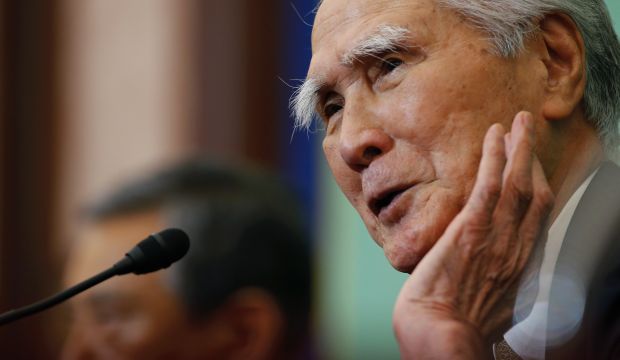
Japan’s former prime minister Tomiichi Murayama (R) speaks as former chief cabinet secretary Yohei Kono listens during a press conference at the Japan National Press Club in Tokyo, on June 9, 2015. (AP Photo/Shizuo Kambayashi)
Tokyo, AP—Two former Japanese political leaders known for their key apologies over Japan’s Second World War atrocities said Tuesday that Prime Minister Shinzo Abe should not water down their words in a statement marking the 70th anniversary of the war’s end.
Former Prime Minister Tomiichi Murayama, who authored Japan’s landmark 1995 apology marking the 50th anniversary of the end of the war, demanded that Abe “honestly spell out” the country’s wartime actions to address growing international concern that he may revise history.
Yohei Kono, who as chief Cabinet secretary in 1993 apologized to victims of Japan’s wartime military sexual exploitation, said he wondered whether a new statement by Abe is even necessary to mark the 70th anniversary of the war’s end. He said a statement, if issued, should not backpedal from any of the apologies that Abe promised to inherit from past leaders.
The men made the remarks to reporters during a joint appearance at the Japan National Press Club in Tokyo.
Since taking office in late 2012, Abe has said he will not necessarily follow the Murayama apology. He also has said there is no evidence that so-called comfort women were exploited through coercion by Japanese authorities, with critics accusing him of undermining the Kono apology. But after criticism from China and South Korea, Abe later promised not to change either of the statements.
Abe, currently preparing his anniversary statement, has given mixed signals as to how closely it will mirror Murayama’s apology, and has said he does not plan to stick to the same language.
Murayama said Tuesday that the point is not to offer an empty apology, but to show the world as Japan’s leader that Abe has squarely faced the country’s wartime past and pursued its pacifist pledges.
“The international society is watching what [Abe] is really thinking,” Murayama said. “It is important to clear any doubts that he has raised overseas.”
While a Japanese leader’s war anniversary statement is always closely watched, this year’s is getting extra attention, because it marks the 70th anniversary and Abe is considered a revisionist. Abe has convened a panel of experts to advise him on what to say on August 15.
Liberals like Murayama and Kono want Abe to acknowledge Japan’s wartime aggression and colonial rule, while conservatives who support the prime minister say such accounts are exaggerated.
